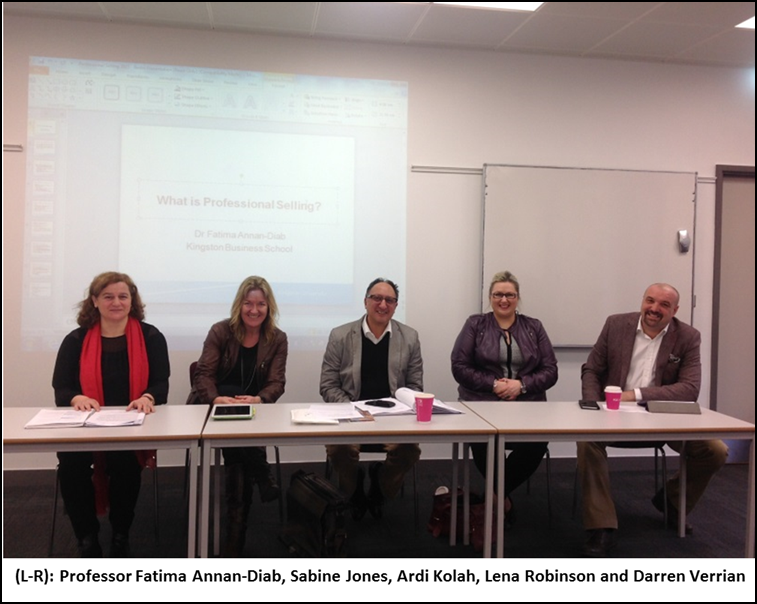 On the 26 March 2015, the Faculty of Business and Law at Kingston University London was host to a delegation of students from the University of Berlin that were on an exchange visit.
On the 26 March 2015, the Faculty of Business and Law at Kingston University London was host to a delegation of students from the University of Berlin that were on an exchange visit.
Part of the itinerary, organised by Dr Amelia Au-Yeung was to explore whether students are adequately prepared for life in the world of commerce and whether business schools are doing enough to equip them to be effective salespeople.
To help stimulate debate as to whether it’s ‘nature or nurture’, I was asked was asked to pull together a panel of experts to debate the issue with our visitors from Germany.
Fatima Annan-Diab, Associate professor at the Faculty of Business and Law referred to research that tended to indicate that a successful salesperson is someone who has the innate ability to influence others and part of that skill was the ability to listen and empathise with the person they’re attempting to do business with.
Lena Robinson, former Business Development Director of Japanese media giant Dentsu Aegis Network and founder of Kiwi Girl made the point that in her experience successful salespeople don’t just focus on talking about the ‘what’ or the ‘how’ but actually engage with the customer on answering the question ‘why’ the product or service is the best solution. “I’m motivated by trying to do my best in providing a solution that’s right for the customer, irrespective of whether that’s a product or a service,” she said.
According to Lena, there wasn’t any right or wrong way to selling and ultimately it was also an intuitive process.
Darren Verrian who’s spent the past decade working in executive training and recruitment and is CEO of a start-up company EU Compliance and Recruitment took a different view and felt that students could be trained to be successful salespeople and it often came down to a question of confidence.
He did accept, however, that ‘sales’ had become a bit of dirty word and gave the example of his son who’s on a management programme at Mercedes and is currently working in sales. “The business card doesn’t give his job title,” explained Darren. He went on to argue that it was more important in the first instance that there’s a relationship built on trust in order for the sale to take place and so not having the title ‘salesman’ on the business card was no big deal.
This point about developing the right kind of relationships with customers and clients was explored further by German-born Sabine Jones who’s spent over 20 years in the global music rights business with organisations including BMG, GEMA, PRS, Nielsen, Swissperform and Kobalt Music.
Sabine said: “You have to believe in what you’re selling or otherwise you won’t be any good at it.” When challenged whether she’d always liked all recording artists she’d ever worked with in her career, Sabine confessed she wasn’t a massive fan of jazz and preferred to consider herself a ‘rock chick’! However, this hadn’t hampered her ability to represent artists of all backgrounds as she too was genuinely motivated to help others achieve their objectives.
So far from being a mindless pursuit to make as much money as possible, the panel were moving towards a view that putting the interests of customers and clients first was the recipe for making a successful career as a salesperson.
It was at that point that Fatima made a startling revelation that three students from the University of Berlin would end up in highly successful careers in sales. When I pressed her as to how she knew without the benefit of a crystal ball, Fatima replied that the answer was to be found in the “twinkle in their eyes”!
So perhaps it’s ‘nature’ rather than ‘nurture’ after all that’s responsible for creating the future generation of entrepreneurs where the skills of selling are acquired in the marketplace rather than the classroom.
And judging by the reaction from our guests from Germany, many left the session with more than just a twinkle in their eyes!
Ardi Kolah is a visiting lecturer at the Faculty of Business and Law and graduated from the School of Law in 1983.














Recent Comments